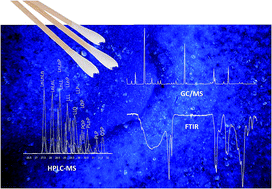A molecular study of modern oil paintings: investigating the role of dicarboxylic acids in the water sensitivity of modern oil paints†
Abstract
The 20th century has seen a significant evolution in artists' paint formulation and technology which is likely to relate to the new conservation challenges frequently presented by modern oil paintings, including unpredictable water- and solvent-sensitivity. This study examined the molecular causes and mechanisms behind these types of modern oil paint vulnerability. Research performed up to now has suggested a correlation between the occurrence of water sensitivity and the presence of relatively high amounts of extractable free dicarboxylic acids. To explore this further, as well as the influence of paint formulation, a set of model paint samples, produced in 2006 using commercial tube paints to which known amounts of additives were added, were analysed. The samples were tested for water sensitivity by aqueous swabbing and characterised using transmission Fourier Transform-Infra Red spectroscopy (FTIR) to determine the molecular composition of the main paint constituents, High Performance Liquid Chromatography-Mass Spectrometry (HPLC-MS), to identify the type(s) of drying oils used as binders, and Gas Chromatography-Mass Spectrometry (GC-MS) using a recently developed analytical procedure that can discriminate and quantify free fatty and dicarboxylic acids, as well as their corresponding metal soaps (carboxylates of fatty and dicarboxylic acids). The results indicated that the addition of small amounts of additives can influence the water sensitivity of an oil paint, as well as its molecular composition. Additionally the nature of the ionomeric/polymeric network appears to be a significant determining factor in the development of water sensitivity.



 Please wait while we load your content...
Please wait while we load your content...